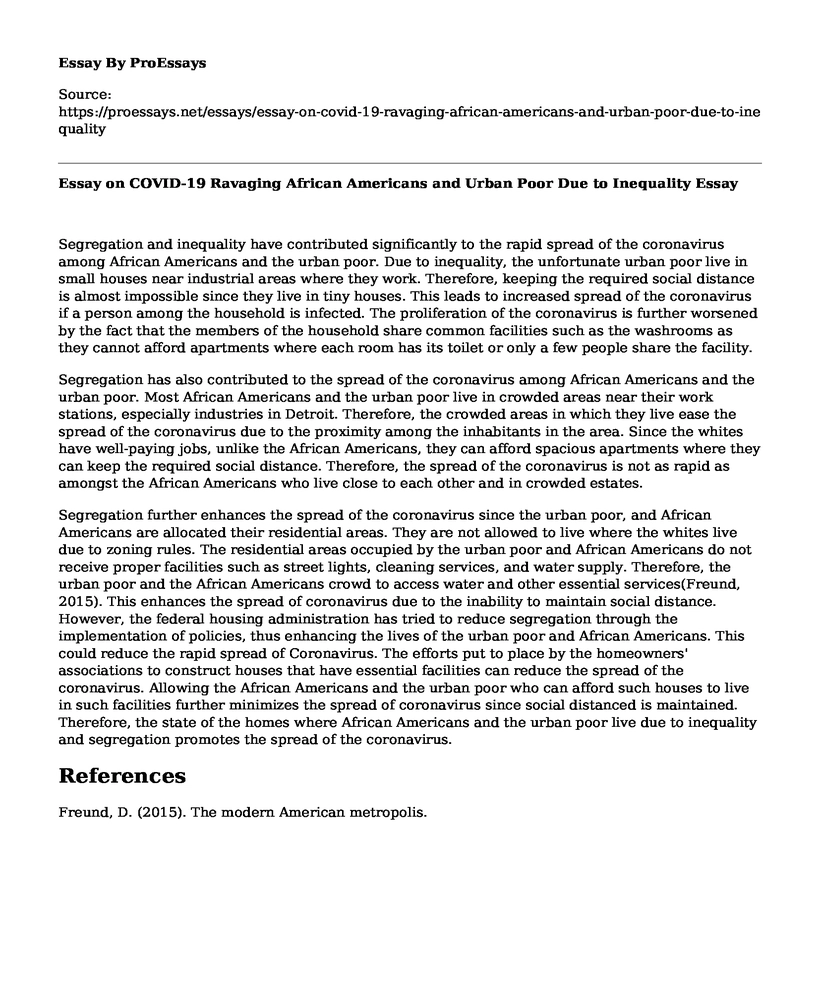Segregation and inequality have contributed significantly to the rapid spread of the coronavirus among African Americans and the urban poor. Due to inequality, the unfortunate urban poor live in small houses near industrial areas where they work. Therefore, keeping the required social distance is almost impossible since they live in tiny houses. This leads to increased spread of the coronavirus if a person among the household is infected. The proliferation of the coronavirus is further worsened by the fact that the members of the household share common facilities such as the washrooms as they cannot afford apartments where each room has its toilet or only a few people share the facility.
Segregation has also contributed to the spread of the coronavirus among African Americans and the urban poor. Most African Americans and the urban poor live in crowded areas near their work stations, especially industries in Detroit. Therefore, the crowded areas in which they live ease the spread of the coronavirus due to the proximity among the inhabitants in the area. Since the whites have well-paying jobs, unlike the African Americans, they can afford spacious apartments where they can keep the required social distance. Therefore, the spread of the coronavirus is not as rapid as amongst the African Americans who live close to each other and in crowded estates.
Segregation further enhances the spread of the coronavirus since the urban poor, and African Americans are allocated their residential areas. They are not allowed to live where the whites live due to zoning rules. The residential areas occupied by the urban poor and African Americans do not receive proper facilities such as street lights, cleaning services, and water supply. Therefore, the urban poor and the African Americans crowd to access water and other essential services(Freund, 2015). This enhances the spread of coronavirus due to the inability to maintain social distance. However, the federal housing administration has tried to reduce segregation through the implementation of policies, thus enhancing the lives of the urban poor and African Americans. This could reduce the rapid spread of Coronavirus. The efforts put to place by the homeowners' associations to construct houses that have essential facilities can reduce the spread of the coronavirus. Allowing the African Americans and the urban poor who can afford such houses to live in such facilities further minimizes the spread of coronavirus since social distanced is maintained. Therefore, the state of the homes where African Americans and the urban poor live due to inequality and segregation promotes the spread of the coronavirus.
References
Freund, D. (2015). The modern American metropolis.
Cite this page
Essay on COVID-19 Ravaging African Americans and Urban Poor Due to Inequality. (2023, May 30). Retrieved from https://proessays.net/essays/essay-on-covid-19-ravaging-african-americans-and-urban-poor-due-to-inequality
If you are the original author of this essay and no longer wish to have it published on the ProEssays website, please click below to request its removal:
- Essay Example on Health Care Reform Act
- Research Paper on Hypoglycemia
- Autonomy, Liberty Rights, and the Principle of Noninterference in Drugs and Alcohol
- Insoluble Fiber and Carbohydrate Consumption Paper Example
- Climate Change Causing Drought and How This Impacts Regional Young Australians 18-35 Paper Example
- Essay on Weight Loss Intervention for Obese and Overweight Children and Adolescents
- Research Paper on Learning Disabilities: Discrimination and Inappropriate Care







